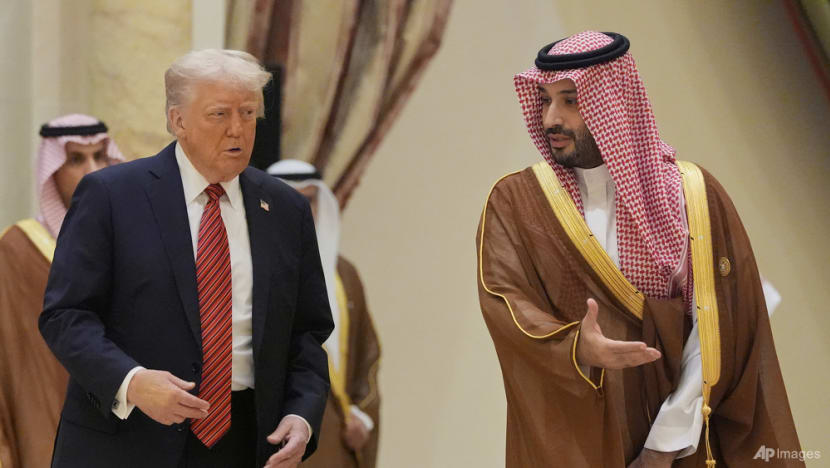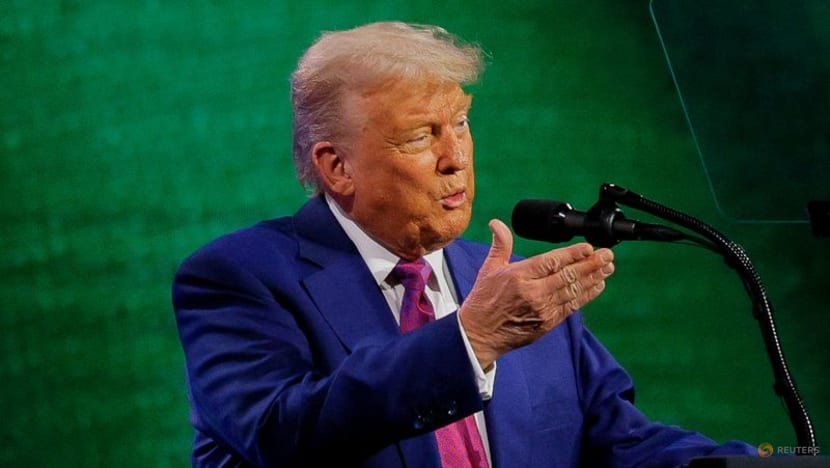What’s at stake as the US gives Saudis access to state-of-the-art AI chips
Previously, the US had restrictions on delivering advanced technology to the region as part of broader controls on the spread of US AI-related tech.

President Donald Trump arrives with Saudi Crown Prince Mohammed bin Salman for the group photo with Gulf Cooperation Council leaders during the GCC Summit in Riyadh, Saudi Arabia, May 14, 2025. (Photo: AP/Alex Brandon)

This audio is generated by an AI tool.
President Donald Trump’s administration has changed the direction of US AI policy toward two oil-rich states in the Middle East. It’s paved the way for Saudi Arabia and the United Arab Emirates to buy chips from Nvidia and Advanced Micro Devices that are considered state-of-the-art when it comes to creating and running artificial intelligence software and services.
Previously, the US had restrictions on delivering advanced technology to the region as part of broader controls on the spread of US AI-related tech.
Those constraints have been motivated by national security concerns and, more broadly, the desire to keep the capabilities out of China’s hands.
What restrictions did the Trump administration lift?
The Commerce Department announced May 13 that the US was rescinding the so-called AI diffusion rule launched by Trump’s predecessor, Joe Biden, which created three broad tiers of access for countries seeking AI chips.
The rule would have taken effect May 15. Trump’s administration is drafting its own approach and could shift toward negotiating individual deals with countries, according to people familiar with the matter.
At the same time, the Commerce Department issued guidance stating that the use “anywhere in the world” of Ascend artificial intelligence chips made by China’s Huawei Technologies violates the US government’s export controls.
It also warned against the use of “US AI chips for training and inference of Chinese AI models”.
What’s in the offing for Saudi Arabia and the UAE?
Saudi Arabia’s state-run investment firm has created a company called Humain that is spearheading a push by the kingdom into AI infrastructure.
Under a deal announced during a visit by Trump to the Gulf region, Humain is to receive “several hundred thousand” of Nvidia’s most advanced processors over the next five years, starting with 18,000 of its cutting-edge GB300 Grace Blackwell products and its InfiniBand networking technology.
The Trump administration hasn’t formally announced it has given permission to export the technology, but the president was an active participant in the announcement of the deals.
Global AI, a US tech venture, also plans to collaborate with Humain, in an agreement expected to be worth billions of dollars, according to a person familiar with the matter.
Amazon.com and Humain are investing US$5 billion in an “AI zone” in Saudi Arabia. California-based Cisco Systems is also partnering with Humain as well as with the AI company G42, which is based in Abu Dhabi, the capital of the UAE.
The Trump administration is weighing a deal that would allow the UAE to import more than a million advanced Nvidia chips, people familiar with the matter told Bloomberg.
The deal would let the UAE import 500,000 of the most advanced chips each year from now to 2027, said the people. One-fifth would be set aside for G42, while the remainder would go to US companies building data centres in the Gulf nation, according to the people.
Why are US components important to the Saudis and Emiratis?
The two countries, like others across the globe, want to build national capabilities in the rapidly advancing field of AI. The technology is seen as the key to future competitiveness in a wide range of spheres, including national defence, modern manufacturing and consumer services.
The fear of being left behind is growing, as is the willingness to spend massively on AI infrastructure. Nvidia’s chips, and to an extent those from Advanced Micro Devices (AMD), are currently the best by far at turning mountains of data into software and services that get close to, or in some cases exceed, human intelligence.
What was the argument for loosening the restrictions?
In its statement, the Commerce Department said that the Biden administration’s regulations “would have undermined US diplomatic relations with dozens of countries by downgrading them to second-tier status”.
In strenuous lobbying efforts in Washington, Nvidia and other companies have argued that restrictions on the export of their chips are counterproductive. They say that by limiting access to the products of American technology companies, the US has invited their rivals, such as Huawei, to step in to offer up their limited but improving alternatives.
So not only is the revenue of US companies crimped, hindering their ability to maintain their technical edge, but other countries will develop capabilities outside of US influence. The argument goes that if overseas AI infrastructure is based on the products of American companies, it can be monitored and influenced by the US.
Is everyone onboard?
No. A key lawmaker on the House Select Committee on China, who has long sounded the alarm about G42’s ties to Huawei and other companies in China, voiced his concern.
“We need safeguards in place before more agreements move forward,” Representative John Moolenaar, the top Republican on the panel, said in a post on X.

What’s at stake for US technology companies?
Providing the infrastructure to make possible what’s known as sovereign AI has become the next frontier for a range of tech companies. That’s the phrase coined to encompass the efforts of various governments to make sure there are data centres within their national boundaries capable of cutting-edge AI work.
For chipmakers in particular, it’s an opportunity to lessen dependence on the spending of a few large US companies. That group, the so-called hyperscalers — Microsoft, Amazon.com and their peers — currently dominate the investment in AI data centres. They’re also developing in-house chips that could replace those from Nvidia or AMD.
Why has the Middle East become a focal point?
Saudi Arabia and the UAE for years, have tried to make their economies less reliant on the export of fossil fuels and see AI as a way to accelerate their diversification efforts. They’ve got money to invest and are willing to deploy it rapidly, which is important because AI infrastructure doesn’t come cheap.
Nvidia chips can cost tens of thousands of dollars each, and creating a system that’s competitive requires stringing tens of thousands of them together with expensive networking and cooling. All that computing horsepower sucks up a huge amount of electricity. The two countries have access to relatively cheap fossil-fuel power and aim to expand renewable energy generation.
What’s the US getting in return for the easing of AI controls?
The AI initiatives were announced amid a flurry of other deals benefiting US companies unveiled during Trump’s visit to the region. Trump and Saudi Crown Prince Mohammed bin Salman claimed the agreements were worth US$1 trillion, but the actual tally appeared to be closer to US$300 billion, including defence sales valued at US$142 billion.
Other deals included one by Saudi aircraft leasing company AviLease to purchase US$4.8 billion of passenger jets from Boeing. Trump adviser Elon Musk said the kingdom agreed to authorise the use of his Starlink service in aviation and maritime shipping.
Separately, ahead of Trump’s visit, the US State Department approved about US$1.4 billion in arms sales to the UAE.
















